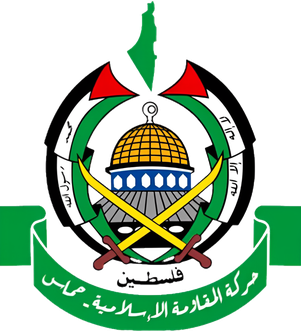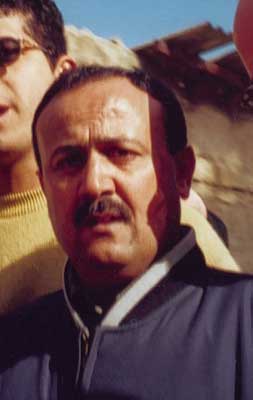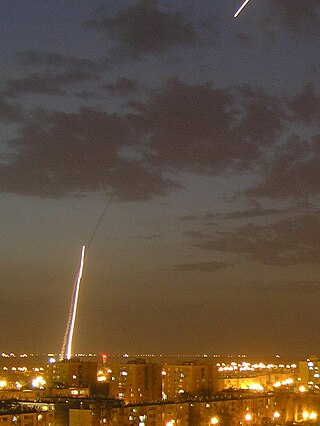
The Gaza Strip, or simply Gaza, is a polity and the smaller of the two Palestinian territories. On the eastern coast of the Mediterranean Sea, Gaza is bordered by Egypt on the southwest and Israel on the east and north.

Hamas, an acronym of its official name, Harakat al-Muqawama al-Islamiya, is a Palestinian Sunni Islamist political and military movement governing parts of the Israeli-occupied Gaza Strip.

The Second Intifada, also known as the Al-Aqsa Intifada, was a major uprising by Palestinians against the Israeli occupation, characterized by a period of heightened violence in the Palestinian territories and Israel between 2000 and 2005. The general triggers for the unrest are speculated to have been centered on the failure of the 2000 Camp David Summit, which was expected to reach a final agreement on the Israeli–Palestinian peace process in July 2000. An uptick in violent incidents started in September 2000, after Israeli politician Ariel Sharon made a provocative visit to the Al-Aqsa compound, which is situated atop the Temple Mount in East Jerusalem; the visit itself was peaceful, but, as anticipated, sparked protests and riots that Israeli police put down with rubber bullets, live ammunition, and tear gas. Within the first few days of the uprising, the IDF had fired one million rounds of ammunition.

Marwan Hasib Ibrahim Barghouti is a Palestinian political leader convicted and imprisoned for murder by an Israeli court. He is regarded as a leader of the First and Second Intifadas. Barghouti at one time supported the peace process, but later became disillusioned, and after 2000 went on to become a leader of the Second Intifada from the West Bank. Barghouti was a leader of Tanzim, a paramilitary offshoot of Fatah.

The Karni Crossing was a cargo terminal on the Israel-Gaza Strip barrier located in the north-eastern end of the Gaza Strip that existed between 1994 and 2011 and used for the export and import of goods from/to the Gaza Strip. This was done as a 'back-to-back' transfer, meaning that Palestinian products meant for export were removed from a Palestinian truck and placed in an Israeli truck, and vice versa for incoming goods. The Karni Crossing was also used by the residents of Netzarim since the Karni road was the only route to that isolated Israeli settlement on which Jewish travel was allowed after the 1994 implementation of the Oslo Accords. The crossing has been affected by the Israeli Blockade of the Gaza Strip.
Nasser al-Din al-Shaer is the former Education Minister of the Palestinian National Authority serving as a member of Hamas. He also served as Deputy Prime Minister in the previous cabinet. After the Hamas takeover of the Gaza Strip, all Hamas ministers in the PNA government were dismissed, including al-Shaer.

Jennifer Griffin is an American journalist who works as Chief national security correspondent at the Pentagon for Fox News. She joined Fox News in October 1999 as a Jerusalem-based correspondent. Prior to the posting, she reported for three years from Moscow for Fox News.
Operation Bringing Home the Goods was a raid launched by the Israel Defense Forces (IDF) on March 14, 2006, on a Palestinian prison in Jericho. The prison held several prisoners wanted by Israel, whose incarceration was monitored by British and American wardens. In early 2006, the newly elected Hamas government announced that it intended to release the prisoners.

Islamism in the Gaza Strip involves efforts to promote and impose Islamic laws and traditions in the Gaza Strip. The influence of Islamic groups in the Gaza Strip has grown since the 1980s. Following Hamas' victory in the 2006 Palestinian elections and a conflict with supporters of the rival Fatah party, Hamas took complete control of the Gaza Strip, and declared the "end of secularism and heresy in the Gaza Strip". For the first time since the Sudanese coup of 1989 that brought Omar al-Bashir to power, a Muslim Brotherhood group rules a significant geographic territory. Gaza human-rights groups accuse Hamas of restricting many freedoms.
The 2010 Palestinian militancy campaign was a coordinated effort by 13 Palestinian militant groups, led by Islamist group Hamas, to derail peace talks between Israel and the Palestinian Authority. The campaign consisted of attacks against Israelis in the Israeli-occupied West Bank and Israel in which, according to a Hamas declaration in early September, "all options are open". The participating groups also included Palestinian Islamic Jihad, the Popular Resistance Committees and an unnamed splinter group of Fatah. Some Israeli and Palestinian officials and analysts familiar with Hamas believe that the true target of the campaign is the Palestinian Authority, which is led by Mahmoud Abbas of Fatah.

In November 2012, the Israel Defense Forces (IDF) launched Operation Pillar of Defense, which was an eight-day campaign in the Hamas-governed Gaza Strip, beginning on 14 November 2012 with the killing of Ahmed Jabari, chief of the Gaza military wing of Hamas, by an Israeli airstrike.
Marwan Abdel Karim Ali Issa was a Palestinian militant who was the deputy commander of Hamas' military wing, the Izz ad-Din al-Qassam Brigades.

The two-state solution to the Israeli–Palestinian conflict proposes to resolve the conflict by establishing two nation states in former Mandatory Palestine. The implementation of a two-state solution would involve the establishment of an independent State of Palestine alongside the State of Israel.
Khalil al-Hayya is a senior Hamas official who was elected to the Palestinian Legislative Council on 25 January 2006 as a representative of Gaza City. He resided in the neighborhood of Shuja'iyya.
The 2014 Jerusalem unrest, sometimes referred as the Silent Intifada is a term occasionally used to refer to an increase in violence focused on Jerusalem in 2014, especially from July of that year. Although the name "silent intifada," appears to have been coined in the summer of 2014, suggestions that there should be or already is an incipient intifada had circulated among activists, columnists, journalists and on social media since 2011. Commentators speculated about the varying utility to the Palestinian and Israeli left, right, and center of not only of naming, but of asserting or denying that there is or is about to be a new intifada.

On December 6, 2017, the United States of America officially recognized Jerusalem as the capital city of the State of Israel. American president Donald Trump, who signed the presidential proclamation, also ordered the relocation of the American diplomatic mission to Jerusalem from Tel Aviv, constituting what is now the Embassy of the United States in Jerusalem, which was established on the grounds of the former Consulate General of the United States in Jerusalem. Israeli prime minister Benjamin Netanyahu welcomed the decision and praised the announcement by the Trump administration. On December 8, U.S. Secretary of State Rex Tillerson clarified that Trump's statement "did not indicate any final status for Jerusalem" and "was very clear that the final status, including the borders, would be left to the two parties to negotiate and decide" in reference to the recognition's impact on the Israeli–Palestinian peace process.

Israel Ziv is an Israeli retired general who held several prominent posts including the head of the Israel Defense Force's Operations Directorate. During the 2023 Israel–Hamas war, Ziv emerged as a symbol of individual resistance and initiative, engaging directly in conflict zones, organizing military efforts, and spearheading civilian defense initiatives amidst a Hamas incursion.
The September 23, 2005 Jabalia Camp incident happened when Hamas was holding a rally or a parade in the Jabalia refugee camp in the Gaza Strip, following the Israeli disengagement from Gaza. At least 19 Palestinians, both militants and civilians, were killed in what was described as an explosion or a series of explosions. At least two children were among the dead. Additionally, over 80 Palestinians were injured.










